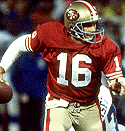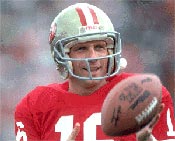Joe's Top 10
(The following article appeared in the Official Super Bowl XXXIV Game Program)
Joe Montana won’t attach rankings to his favorite games. That would be too much like ranking his kids. But he was happy to recount the 10 that he remembers most fondly from a career of memorable games. Here is his personal treasure chest, presented chronologically:
Dec. 7, 1980: 49ers 38, Saints 35 (OT)
The 49ers trailed 35-7 at halftime and 35-21 after three quarters. Montana passed for two touchdowns and ran for another in the first of 26 fourth-quarter comeback victories during the Joe Era in San Francisco. It was the greatest regular-season comeback in NFL history.
 |
“This was at the beginning of things for us. It was a game we could look back at, to remind us what we could do offensively. It really built our confidence.
“Our field all that year was a quagmire from all the rain. I hit Dwight [Clark] on a little crossing route, he took the ball, ran to our sideline, and cut back for a long TD. We were all shocked that he could run that fast in the mud. He told us he lost his defender by taking him into the muddiest part of the field.”
Jan. 10, 1982: 49ers 28, Cowboys 27
The game of "The Catch." The 49ers had smoked the Cowboys 45-14 earlier in the season, but the tables were turned late in the 1981 NFC Championship Game. The Cowboys led 27-21 with 58 seconds left when Montana was flushed out of the pocket, rolled to his right, and passed six yards to a leaping Dwight Clark in the end zone. Montana, buried under Ed (Too Tall) Jones and Harvey Martin, didn’t see the catch.
"When I rolled over, I saw Dwight’s feet hit the ground and the crowd went crazy. That game was a turning point for our organization.
"We beat ’em the first game, and the funny thing was they still didn’t show us any respect, they kept talking. Most teams are quiet after you beat ’em. There was a lot of talking going on during the game, a lot. In the third quarter, Harvey Martin sacked me and he said, ‘Don’t worry, I will be back.’ I told him, ‘Good, I was beginning to think you weren’t here today.’”
Jan. 24, 1982: 49ers 26, Bengals 21
A so-so statistical game for Montana — 14 completions in 22 attempts for 157 yards — but he was selected the Most Valuable Player of Super Bowl XVI.
"We took two buses to the game in Pontiac, and the one I was in got stuck in traffic. Bill [Walsh] was trying to keep us loose. He pretended to be listening to the game on the radio. He said, ‘We’re up 7-0, Chico Norton [the team equipment man] just scored a TD.’
"I was more excited that week than I thought I’d be. But Bill kept it loose, made it fun. When we checked in, he disguised himself as a hotel bell man and carried our bags. At practice, if we got our work done, he made it fun.
“I was nervous going in to the game, but once it got started, it went right to being a normal game again. I was glad of that.”
Jan. 20, 1985: 49ers 38, Dolphins 16
Miami’s Dan Marino was coming off one of the greatest seasons of any quarterback in history, and the talk before Super Bowl XIX centered around the 49ers’ challenge of stopping this passing monster. But the monster this day was Montana (24 of 35 for 331 yards and three touchdowns). He even ran for a touchdown.
 |
“Everybody was overlooking our team, especially our defense. We came into the locker room after pregame warmups, and that’s usually a quiet time. Bill laid down in the middle of the floor, put his head on an equipment bag, and started talking out loud, to himself. ‘Yeah, that Marino, he’s the greatest quarterback I’ve ever seen … The 49er defense just isn’t going to be able to stop him … And that Dolphins’ defense…’
“He went on like that for maybe 10 minutes. Nobody said anything, we just listened. We soaked it in, then we just shut ’em down.
“I thought I played pretty well, but I had great protection; I had a lot of time. Carl Monroe made a great fingertip catch, Roger Craig made a big play out of a little cross. On my touchdown run, I dived into the end zone. I had a bad cold, and snot came out my nose and was hanging all over my facemask. I was thinking, ‘Oh, no, here I am on national TV.’ You remember stupid stuff.”
Nov. 9, 1986: 49ers 43, St. Louis Cardinals 17
Montana had undergone major back surgery two months earlier, and a big question hung in the air: Could he still play? He answered with 270 passing yards and three touchdowns. Late in the first quarter, he hit Jerry Rice on a 45-yard scoring play and was slammed on his back on a hit by linebacker Charles Baker.
“I was wondering what would happen if I took a hit. He hit me, knocked me onto my back, and I felt better. I just wanted that hit.”
Sept. 11, 1988: 49ers 20, Giants 17
Montana had bruised his passing elbow the previous week and sat out the first half, quietly seething as Steve Young played. With the score 10-10, Walsh started Montana in the second half. On third-and-10 from the 49ers’ 22, with 50 seconds left to play, Montana hit Rice on a 78-yard touchdown pass that gave the 49ers a victory at the Meadowlands. They went on to win Super Bowl XXIII.
“The Giants always were a team we just battled. They were always a physical team, and we were never considered to have a physically punishing offense. This game showed us that we could play with that type of team.”
Jan. 22, 1989: 49ers 20, Bengals 16
With 3:10 left in Super Bowl XXIII, the 49ers had possession at their 8-yard line, trailing the Bengals 16-13. An 11-play drive ended with Montana’s game-winning 10-yard pass to John Taylor — a play that the quarterback concedes was his number-one Super Bowl thrill. Almost as well remembered was an incident during a time out on that drive, when Montana glanced at the sidelines and said, “Hey, look, there’s John Candy!”
“On the Candy thing, [tackle] Harris Barton was always so uptight, I wanted to loosen him up. We had a time out, and Harris was just staring into space. I just wanted to get him to smile.
“On the touchdown pass, we had the backs split behind me, and I didn’t know until later but they were lined up on the wrong sides. Had the Bengals sent a blitzer from my right side, he never would have been blocked. I wouldn’t have seen him, and I probably would have fumbled.”
Sept. 24, 1989: 49ers 38, Eagles 28
Through three quarters, Buddy Ryan’s fabled “46” defense had sacked Montana eight times, and the Eagles had a 21-10 lead. In the fourth quarter, Montana completed 11 of 12 passes for 227 yards and four touchdowns.
“Their defense was handling everyone that year. Our first series, I threw a long touchdown pass to Jerry. It looked like it was going to be a good day for us. Then we got mauled, especially me. They had Reggie White and that big front four, and all I remember is getting my ass beat all day. It was an ugly, ugly day.
“The last touchdown, Jerry ran a ‘go,’ I just let it fly, and he made the catch in the end zone. That was the sorest I’ve ever been after a game.”
Jan. 28, 1990: 49ers 55, Broncos 10
In his last Super Bowl Bowl (XXIV), Montana completed 13 consecutive passes at one point, was 22 of 29 for the game, and accumulated 297 passing yards and five touchdowns.
“To have it go that well in a Super Bowl makes the game fun while it’s going on. But you get to a point you start thinking about what it must be like to be on the other side. You think about how hard they worked to get there. It was like, ‘I really hope we don’t get in the end zone again.’”
Dec. 28, 1992: 49ers 24, Lions 6
The final regular-season game meant nothing in the standings, but it was Montana’s 49ers farewell. Management had made it all but official that Steve Young was the future. Montana had not played a game since the 1990 NFC Championship Game because of elbow surgery, and he didn’t play until the second half. He completed 15 of 21 passes for 126 yards and two touchdowns.
“That game was almost my audition tape for my next job, and I had to prove I could still play. I went out with the attitude that I did not care what the score was, I was playing like it was a Super Bowl. I was happy and sad at the same time.”

